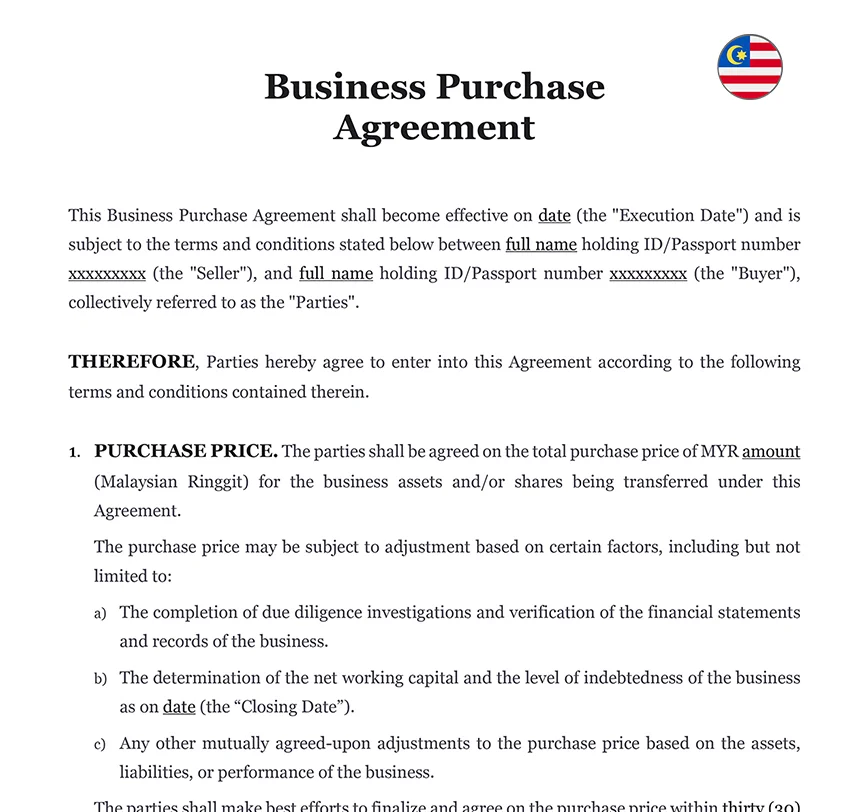Ready to use legal template
Drafted by experienced lawyers
Compliant with Hong Kong law
Ready to use legal template
Drafted by lawyers
Compliant with Hong Kong law
Home › Business contracts › Business Purchase Agreement
Learn more about Business Purchase Agreement in Hong Kong
A Business Purchase Agreement is a legally binding contract that outlines the terms and conditions of buying or selling a business. It details essential aspects such as purchase price, payment terms, asset transfer, liabilities, and warranties, ensuring clarity and legal protection for both buyer and seller. In Hong Kong, a well-drafted agreement is crucial for safeguarding interests, preventing disputes, and ensuring compliance with local regulations. Whether acquiring a small enterprise or a large corporation, having a professionally prepared contract minimizes risks and secures a smooth transaction. At Themis Partner, our Business Purchase Agreement is drafted by experts, ensuring it meets Hong Kong’s legal standards while being easy to edit in Word format. Download our customizable template today to streamline your business acquisition with confidence and legal certainty.
Table of contents
-
What is a Business Purchase Agreement in Hong Kong?
-
What is included in this Business Purchase Agreement?
-
Why do I need a business acquisition contract in Hong Kong?
-
How do I transfer ownership using a Business Sale Agreement?
-
How do I calculate the purchase price in a business acquisition agreement?
-
Can a Business Purchase Agreement include non-compete clauses?
-
How does it differ from a Share Purchase Agreement?
-
What legal risks should I consider in a Business Sale Contract?
-
How can I ensure my Business Acquisition Agreement is legally binding?
What is a Business Purchase Agreement in Hong Kong?
A Business Purchase Agreement in Hong Kong is a legally binding contract that outlines the terms for acquiring or selling a business. This includes both asset purchase transactions and full company takeovers. According to the Hong Kong Companies Registry, proper documentation is critical to register ownership changes and ensure legal compliance with local regulations. that governs the sale and transfer of a business’s assets, operations, or equity interests. It is used when a business owner (the Seller) agrees to sell either the entire company or specific components of the business to a Buyer. This may include tangible assets (equipment, inventory), intangible assets (IP, customer lists), and contractual rights.
This agreement plays a crucial role in documenting the terms of the sale and ensuring the smooth transfer of ownership and responsibilities. It is particularly important in regulated industries or when the transaction involves complex assets. Buyers and sellers should ensure that the contract is clearly structured and legally sound, with all obligations and risks properly allocated between the parties.
What is included in this Business Purchase Agreement?
A standard Business Purchase Agreement in Hong Kong includes the following key clauses:
| ➤ Purchase Price: Specifies the total consideration for the business and details any adjustment mechanisms, such as changes based on working capital or final audits. |
| ➤ Assets and Liabilities: Lists all assets being sold and clarifies which debts and obligations are assumed by the Buyer versus retained by the Seller. |
| ➤ Due Diligence: Allows the Buyer to review financial statements, tax records, customer and supplier contracts, employee details, and any pending litigation. |
| ➤ Representations and Warranties: The Seller affirms that the business is legally owned, operationally compliant, and financially accurate with no hidden liabilities. |
| ➤ Covenants: Defines actions both parties agree to before the closing date, including maintenance of normal business operations, and provisions related to confidentiality, non-compete, and non-solicitation. |
| ➤ Closing Conditions: Describes the legal and operational requirements for closing the sale, such as regulatory approval, tax clearance from the Inland Revenue Department, and final due diligence confirmation. |




